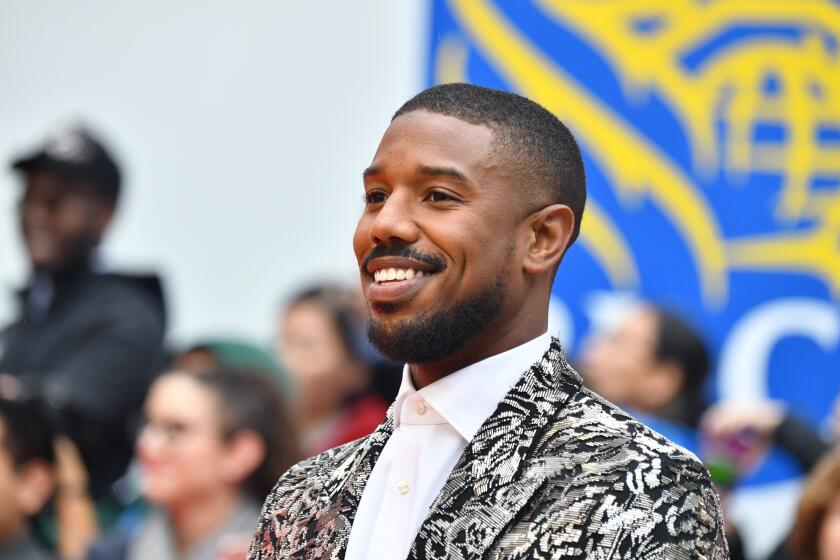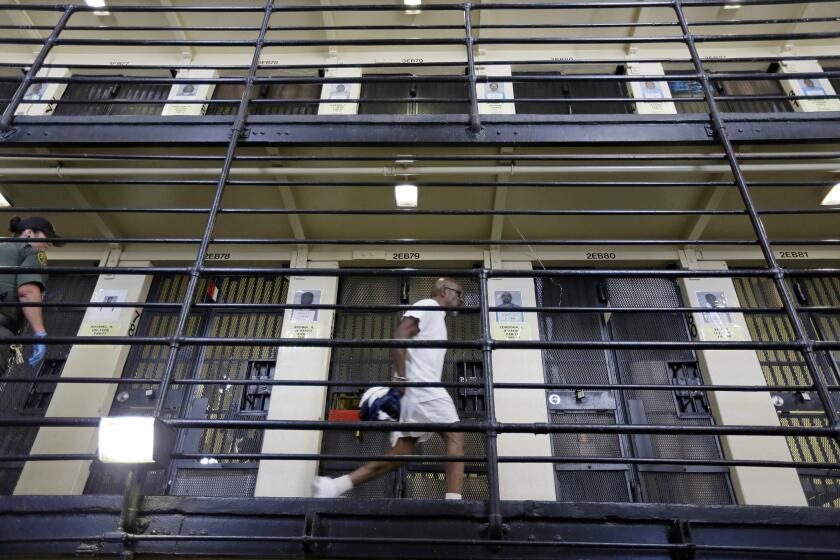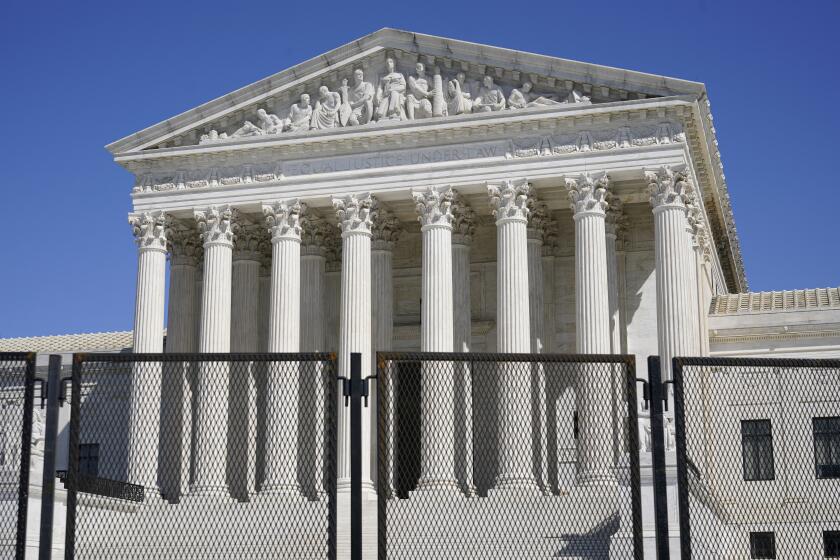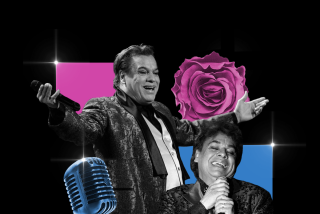Brutalized in prison and freed by Bryan Stevenson, a survivor writes his story
On the Shelf
My Time Will Come: A Memoir of Crime, Punishment, Hope, and Redemption
By Ian Manuel
Pantheon: 224 pages, $26
If you buy books linked on our site, The Times may earn a commission from Bookshop.org, whose fees support independent bookstores.
As a child in one of Tampa, Fla.’s poorest and most violent housing projects, Ian Manuel was abused or abandoned by each member of his immediate family.
As a 13-year-old in 1990, he shot a woman in the face during a robbery gone awry.
Manuel confessed to the crime, but the judge said he wanted to make an example of the boy and sentenced him to life without parole (plus 40 years). “They decided I was never fit to live in society again,” Manuel says.
From there, it got far worse. Manuel was subjected to what many would consider cruel and unusual punishment. Starting at age 15 in 1992, he spent nearly all of the next 18 years in solitary confinement.
Even with nothing but darkness at the end of the tunnel, Manuel was determined to have a voice, to express the damage done by an inhumane and corrupt system. Nearly five years after being freed thanks to the work of hero lawyer Bryan Stevenson (“Just Mercy”) and his Equal Justice Initiative, Manuel is speaking out in his new memoir, “My Time Will Come.”
“I was driven by this overwhelming feeling that I was born for something more than what I was surrounded by,” Manuel says during an interview over breakfast at his go-to restaurant in Brooklyn. “My mantra is that the impossible is obtainable. I constantly pushed myself to dream beyond my prison cell.”
Manuel’s book depicts a carceral system that is brutal through and through, from judges seeking “retribution” rather than justice to corrupt, violent and petty prison workers and mental healthcare that ranges from lackluster to dangerous.
Michael B. Jordan produced and stars in the biopic “Just Mercy,” which had its world premiere at the Toronto Film Festival to great acclaim.
But nothing compares to the use and abuse of solitary confinement, which has repeatedly been shown to cause long-term harm. “Prison is a beast, but solitary confinement definitely did more damage to my soul than being in the general prison population would have,” says Manuel. “In solitary, you have to dive into your imagination, but to stay sane you also have to come up for air. For people for whom reality is too painful, they stay beneath the surface.”
Although Manuel often resorted to self-harm, he remained intact, becoming deeply spiritual and dreaming of freedom, of playing basketball or video games with friends. But his ultimate survival tool was his love of language.
Manuel wrote constantly. Poetry became a lifeline in solitary, and he began writing a memoir. “Even then I was strategizing about getting my story out there,” he says.
After Stevenson took the issue of life without parole for juveniles to the Supreme Court and won Manuel his freedom, there were endless new challenges. “It took several years to find my equilibrium,” Manuel says; he had 26 of his first 39 years locked up. His first night of sleep in a hotel was glorious — “I didn’t want to leave the next morning”— but everything from crossing the street to choosing his own clothes required profound adjustment. “I didn’t even know my size,” he says. “When I look at pictures from six months out I’m embarrassed. I was off base, with no color coordination.”
The emotional scars ran deeper than fashion, but after a transitional program in Alabama run by Stevenson’s EJI, Manuel went to an intensive therapy program in Arizona. For three weeks, he spent 12 hours a day, seven days a week in therapy — individual, group, equine, EMDR, psychodrama.
“One day during an individual session I was talking about being choked by a nurse and guards who wanted to pump my stomach when I didn’t need it pumped, and I got so caught up in reliving the experience that I couldn’t breathe,” Manuel recalls. “I went straight to the next session and pleaded, ‘Give me a breathing technique.’ And the therapist said, ‘No Ian, you must face what you’re running from. Go back to that moment.’”
In prison, he had learned to push down his pain just to survive. “In therapy, I was finally in a safe place and the dam broke and I started crying, and then I couldn’t stop,” he says.
The inspector general blamed state corrections officials for the outbreak at San Quentin prison, where 28 incarcerated persons and one staff member died of COVID-19.
While he has written a book (with a ghostwriter), Manuel finds he can’t write poems anymore for a good reason: Freedom brings too many distractions and responsibilities. “But also I don’t need it to survive now,” he says.
Writing the memoir was more cathartic than painful — “I really wanted my story out there more than I wanted to keep it in” — but recording the audiobook was emotionally draining. Except when reciting his poetry: “I really put my heart and soul into that.”
The kind of change he’s seeking is not on the horizon in his home state, which still treats juveniles who commit serious felonies as adults. He’d love to see Florida elect progressives who “care about human rights” but he knows it won’t happen soon. “Florida is just a Republican state.”
Manuel, who now lives in Brooklyn, recently contributed an op-ed to the New York Times about solitary confinement. Shortly afterward — perhaps inspired by the op-ed and certainly eager for a win — New York’s beleaguered Gov. Andrew Cuomo signed an already-passed bill on his desk banning long-term solitary in the state.
The author was deeply saddened, however, by the “horrible” recent decision of the Supreme Court to permit children to be imprisoned for life without parole for homicide. “My story shows what good can happen when you give men who were once kids a second chance,” he says. “I hope to be a living example that the court got it wrong.”
With liberals dissenting, the Supreme Court makes it easier for juveniles convicted of murder to get life in prison without parole.
Before the pandemic, Manuel traveled the country — telling his story, reading letters and poems and airing a short video documentary featuring him, Stevenson and Manuel’s victim, Debbie Baigrie, who forgave him for the shooting long ago. Manuel says he was “waiting for years for the judicial system to catch up to my remorse and her forgiveness.”
He was grounded by COVID-19 but continued doing talks via video. And the “lockdowns” have felt like nothing to him: “I still think, ‘Look at all this freedom I’ve got, what are people complaining about?’” (This Wednesday, he and Stevenson will be on a virtual panel sponsored by ALOUD and the Los Angeles Public Library.)
Manuel is looking forward to getting back on the road, even though he doesn’t love flying and even if it keeps him too busy to write poetry. He intends to write a second book. “I’ve lived so much these last five years,” he says. “I can’t wait to show people where you can come from and where you can land, even if it seems so improbable.”
More to Read
Sign up for our Book Club newsletter
Get the latest news, events and more from the Los Angeles Times Book Club, and help us get L.A. reading and talking.
You may occasionally receive promotional content from the Los Angeles Times.










